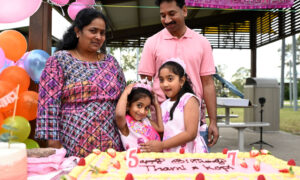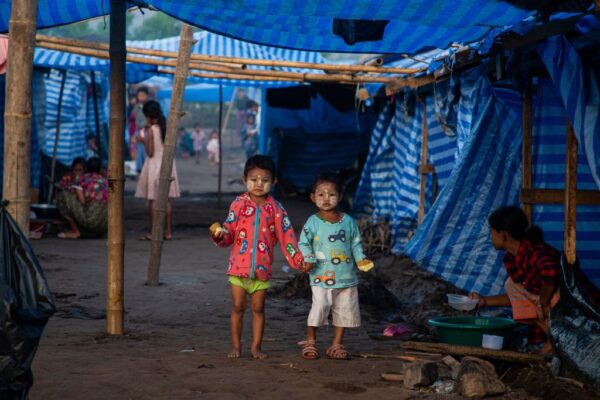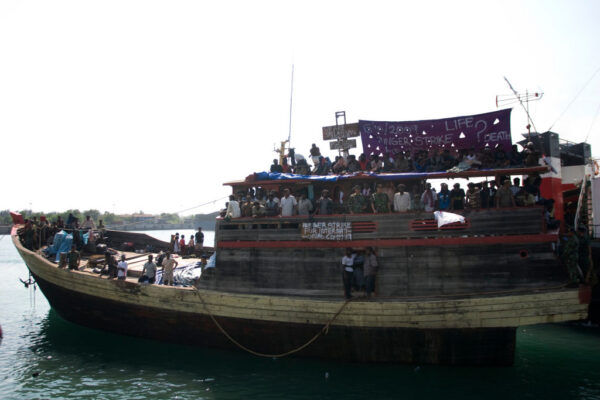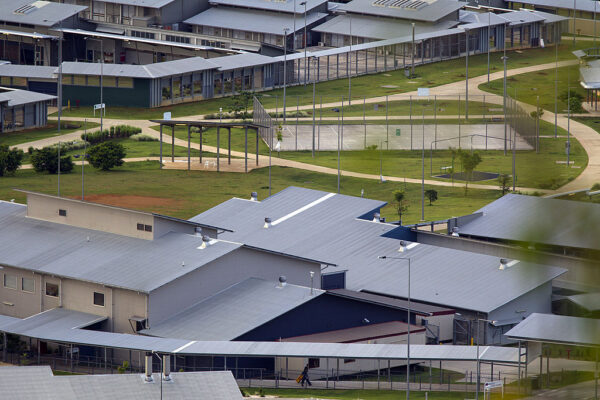Why Give Priority to Those Who Gate-Crash Australia?
Commentary There used to be an advertisement for a particular brand of oil, Castrol GTX2, which told consumers, “oils ain’t oils.” Similarly, people claiming refugee status ain’t necessarily refugees. In dealing with the vexed issue of refugee intake, the government of the day needs genuine wisdom and discernment. To date, the new federal government has not done well in this regard allowing the much-publicised “Biloela family” to remain in Australia despite every single review of their status determining they were not refugees. From departmental officials to the Administrative Appeals Tribunal, to the Federal Court, to the High Court, they all determined there was no claimable refugee status. Yet in the name of some contorted humanitarianism, they were allowed to stay. In doing so, another family languishing in a refugee camp somewhere else in the world that had been determined to be of refugee status was necessarily denied entry to Australia. Hardly humanitarian. Yet that was the determination made and its unfeeling practical outcome. The family on the TV screen was prioritised over an anonymous family languishing in a barren refugee camp for years, if not decades. Neither fair nor humane. Nor clever from a public policy perspective where integrity and consistency in policy is vitally important to keep the opportunists and their criminal people smuggling accomplices out of the equation. This photo taken on Feb. 14, 2022, shows Burmese refugee children, who fled a surge in violence as the military cracks down on rebel groups, looking on at a camp in Nawphewlawl near the Burma-Thailand border in Kayin state. (STR/AFP via Getty Images) What Happened to the ‘Fair Go?’ Despite the information and history readily available for anyone considering these issues, we have a government willing to provide a legal pathway for people currently on Temporary Protection Visas to stay even in the face of those people being deemed to be illegal entrants into Australia—having entered Australia without a visa. Issues of equity must immediately spring to the fore in the mind of any person concerned with fairness. What do those who legally entered Australia but were not allowed to stay have going through their minds? Or those who accepted the situation and went back to their home country or settled in a country that was not their first choice? How about those who have waited patiently applying through the correct channels? Why is priority being given to those who gate-crashed Australia? And above all, what about those who have waited in unsanitary refugee camps hewn from the jungles of Western Thailand? Some of whom have been waiting 20 years for resettlement. They will all be asking what has happened to Australia’s reputation as being the country of a “fair go.” The international community will also be scratching their heads trying to figure out the justice, fairness, and equity in this move by the government, which gives priority to the gate crashers over those who politely ask for admission. Sri Lankan asylum seekers engage in a hunger strike after their boat broke down on the way to Australia’s Christmas Island, in Java, Indonesia, on Oct. 16, 2009. (Oscar Siagian/Getty Images) One sector that this retrograde policy move will energise will be the criminal syndicates engaged in people smuggling. The promotional/advertising value of this policy change to the nefarious people smugglers will be literally gold. At a time of real housing and infrastructure issues, allowing an extra 19,000 people to remain in Australia will exacerbate these very real pressures. As will, their entitlement to family reunions and welfare assistance add to the already over-stretched budget. There is no doubting that those on Temporary Protection Visas were living in legal limbo, but opportunities had afforded them to settle elsewhere or return from where they came, which quite a number did. But just as much as these people lived in “uncertainty” in Australia, keep in mind those who have lived for decades in the “uncertainty” and absolute squalor of refugee camps, not knowing if they will ever be able to make a life of their own. How Do We Decide Who Should Stay? The “out of sight, out of mind” mentality which has motivated this unprincipled approach to border protection is worrisome. One trusts it is not motivated by opportunistic politicking hoping for electoral support from those allowed to stay and their families who will join them while showing a callous disregard for those who, through lack of means or good conscience, refuse to engage criminal people smugglers to advance their cause. In this public policy upheaval, it is reassuring to learn that some realists in the new government have expressed their disquiet, if not outright opposition, to the new policy. Regrettably, these realists are a minority. At the beginning and end of refugee intakes, the policy framework must have integrity, consistency, and fairness. Othe

Commentary
There used to be an advertisement for a particular brand of oil, Castrol GTX2, which told consumers, “oils ain’t oils.”
Similarly, people claiming refugee status ain’t necessarily refugees.
In dealing with the vexed issue of refugee intake, the government of the day needs genuine wisdom and discernment.
To date, the new federal government has not done well in this regard allowing the much-publicised “Biloela family” to remain in Australia despite every single review of their status determining they were not refugees. From departmental officials to the Administrative Appeals Tribunal, to the Federal Court, to the High Court, they all determined there was no claimable refugee status.
Yet in the name of some contorted humanitarianism, they were allowed to stay.
In doing so, another family languishing in a refugee camp somewhere else in the world that had been determined to be of refugee status was necessarily denied entry to Australia. Hardly humanitarian.
Yet that was the determination made and its unfeeling practical outcome.
The family on the TV screen was prioritised over an anonymous family languishing in a barren refugee camp for years, if not decades. Neither fair nor humane. Nor clever from a public policy perspective where integrity and consistency in policy is vitally important to keep the opportunists and their criminal people smuggling accomplices out of the equation.

What Happened to the ‘Fair Go?’
Despite the information and history readily available for anyone considering these issues, we have a government willing to provide a legal pathway for people currently on Temporary Protection Visas to stay even in the face of those people being deemed to be illegal entrants into Australia—having entered Australia without a visa.
Issues of equity must immediately spring to the fore in the mind of any person concerned with fairness.
What do those who legally entered Australia but were not allowed to stay have going through their minds? Or those who accepted the situation and went back to their home country or settled in a country that was not their first choice?
How about those who have waited patiently applying through the correct channels?
Why is priority being given to those who gate-crashed Australia?
And above all, what about those who have waited in unsanitary refugee camps hewn from the jungles of Western Thailand? Some of whom have been waiting 20 years for resettlement.
They will all be asking what has happened to Australia’s reputation as being the country of a “fair go.”
The international community will also be scratching their heads trying to figure out the justice, fairness, and equity in this move by the government, which gives priority to the gate crashers over those who politely ask for admission.

One sector that this retrograde policy move will energise will be the criminal syndicates engaged in people smuggling. The promotional/advertising value of this policy change to the nefarious people smugglers will be literally gold.
At a time of real housing and infrastructure issues, allowing an extra 19,000 people to remain in Australia will exacerbate these very real pressures. As will, their entitlement to family reunions and welfare assistance add to the already over-stretched budget.
There is no doubting that those on Temporary Protection Visas were living in legal limbo, but opportunities had afforded them to settle elsewhere or return from where they came, which quite a number did.
But just as much as these people lived in “uncertainty” in Australia, keep in mind those who have lived for decades in the “uncertainty” and absolute squalor of refugee camps, not knowing if they will ever be able to make a life of their own.
How Do We Decide Who Should Stay?
The “out of sight, out of mind” mentality which has motivated this unprincipled approach to border protection is worrisome.
One trusts it is not motivated by opportunistic politicking hoping for electoral support from those allowed to stay and their families who will join them while showing a callous disregard for those who, through lack of means or good conscience, refuse to engage criminal people smugglers to advance their cause.
In this public policy upheaval, it is reassuring to learn that some realists in the new government have expressed their disquiet, if not outright opposition, to the new policy. Regrettably, these realists are a minority.
At the beginning and end of refugee intakes, the policy framework must have integrity, consistency, and fairness.
Otherwise, it is the simple reality that with all the goodwill in the world, Australia cannot take in all the people deemed refugees, let alone all those claiming refugee status.

Therefore, a policy of prioritisation needs to be developed and followed.
The previous government determined a policy based on considering those most in need and deemed to be refugees by the United Nations as an appropriate commencement point.
Fair, objective, and humanitarian. That unassailable trifecta of considerations of necessity disqualifies those who have never set foot in a refugee camp, bypassed safe haven after safe haven, and paid criminals to advance their cause with a particular destination in mind.
No sensible or sustainable refugee intake policy would countenance such an outcome.
Whether the new Resolution of Status Visa (RSV) will lead to a resurgence in illegal arrivals remains to be seen.
In the meantime, the new government, with its Biloela family and RSV policy, has signalled to the world that if you arrive in Australia illegally and stay long enough using every avenue available, you will ultimately be allowed to stay—albeit at the expense of other would-be entrants with perhaps, a more pressing and genuine need for asylum.
Views expressed in this article are the opinions of the author and do not necessarily reflect the views of The Epoch Times.












